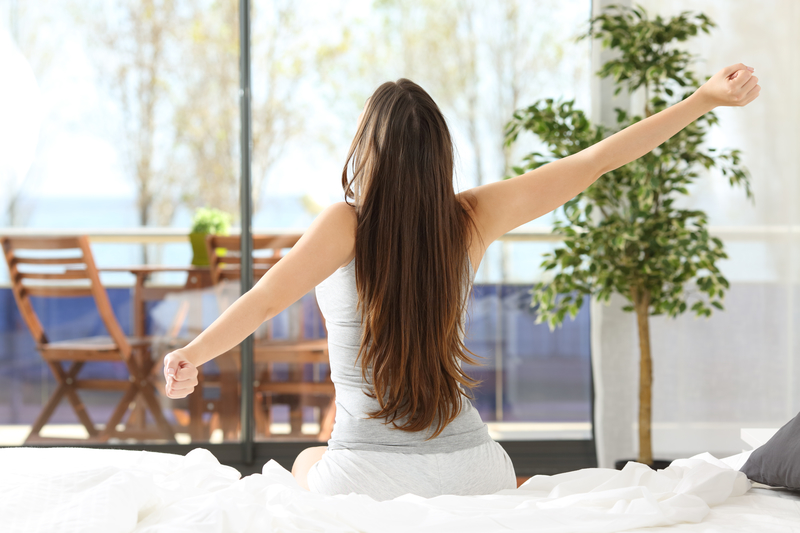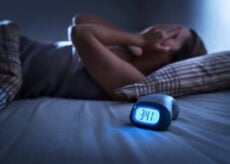Tired of Being Tired? It’s Time to Reset Your Circadian Clock

Do you rely on coffee, energy drinks, or other caffeinated drinks to help perk you up and/or get you through your day? Do you have trouble winding down at night? Or do you find yourself lying in bed wide awake with your figurative wheels turning?
Do you struggle with your energy levels? Does it feel like you’re constantly fighting an uphill battle against fatigue? Have you noticed your body doesn’t handle foods—especially carbohydrates—like it once did?
Speaking of food, have you found that appetite—especially for high-calorie junk foods—seems to be insatiable? And what about your mood? Have you noticed you’ve been feeling a little blue or maybe just a bit more on edge lately?
If any of these questions ring a bit too true, there’s a good chance your internal body “clock” is broken—your circadian clock, or circadian rhythms, that is. Circadian rhythms, which exist in every living thing, refer to the body’s 24-hour cycle of biological processes. Often called the sleep/wake cycle.
Poor-quality sleep, impaired alertness, crappy energy levels, and fatigue are intricately tied to a “broken” circadian clock. But that’s not all. Disrupted circadian rhythms also negatively affect your appetite, carbohydrate tolerance, mood, and more. Let’s take a dive into your circadian rhythm. And, more importantly, how you can go about fixing a broken circadian clock.
Circadian Rhythms 101
The body’s “master clock” is called the suprachiasmatic nucleus (SCN). The key to a properly-timed SCN is a group of photoreceptors in the eyes called photosensitive retinal ganglion receptors. (Sorry for the scientific terminology here!) These receptors send information to the master clock about the levels of brightness in your surroundings. I’ll spare you the rest of the fascinating details. What is important to appreciate is that light—or lack thereof—is the key piece of information for the circadian system.
While the SCN is the body’s master clock, there are other smaller circadian clocks throughout the body. These govern the behavior of our cells. In other words, with light as its cue, the master clock signals to the rest of the body when it’s time for all the physiological processes and changes we experience throughout the day.
You can think of this system of clocks like one you might find in a school. Each classroom clock is bound to a “master clock.” Obviously, this type of system is crucial for the school day to run efficiently (e.g., classes start and end “on time”). If any clock were “broken”—especially the master clock—you’d expect chaos.
In much the same way, when the body’s master clock is broken, bad things happen. In fact, when circadian rhythms are disrupted for extended periods of time, it puts an extraordinary strain on the body. And this strain increases the risk for a number of very serious health issues, including cancer, heart disease, type 2 diabetes, depression, and Alzheimer’s and other neurodegenerative diseases. A broken clock can have profound negative effects on your energy levels, your ability to think clearly, your appetite, and weight management to boot.1,2 I think we can all agree we want our personal clocks ticking correctly.
While light and dark are the primary drivers of the body’s circadian clock, many factors can disrupt circadian rhythms. This includes what and when you eat, if and when you exercise, shift work, travel (i.e., jet lag), poor sleep hygiene, stress, and more.
10 Ways to Reset Your Circadian Clock
• Block blue light in the evening. Arguably one of the biggest factors disrupting circadian rhythms in today’s society is our exposure to blue light. Blue light is ubiquitous in the forms of fluorescent lightbulbs, cell phones, tablets, computer monitors, TV screens, and more.3
See, blue light suppresses melatonin production, delaying feelings of sleepiness and the onset of our nighttime cycle. This disrupts circadian rhythms as well as sleep. Try the following strategies 2 to 3 hours before bed:
- Avoid TV and computer screens
- Use the app f.lux if you must use your computer
- Use a similar app if you must use your smartphone (i.e., Night Shift for iPhones)
- Dim your lights
- Use amber-tinted light bulbs
- Wear amber-tinted, blue-light-blocking glasses
• Blackout your room. At night, make your room as dark as possible, using dark curtains and removing all sources of artificial light.
• Consider adding melatonin. Circadian disruption—as a result of long-distance travel (changing time zones), shift work, or increased light exposure at night—leads to a blunted melatonin rhythm and poor sleep quality (not to mention increased risk of numerous health conditions). Even though melatonin is a hormone, it’s available in supplement form. There’s some research to suggest that short-term melatonin supplementation may improve sleep, morning alertness, and cognitive performance.1 Also, fruits like cherries, pineapples, oranges, kiwifruit, and bananas, which have high levels of naturally-occurring melatonin (which is also an antioxidant), have been shown to elevate levels of melatonin in the body.
• Bright outdoor light in the morning. On the other end of the spectrum, getting sunlight exposure first thing in the morning can have a substantial effect on setting your circadian clock to help you feel more awake during the day. In fact, a lack of sunlight exposure may be even more to blame for circadian disturbances than excess artificial blue light exposure at night. If you were to take away only one action item from this article, it would be this.
• Consider bright light therapy. While outdoor exposure to as much sunlight as possible is ideal, research has shown that using bright artificial light (i.e., bright light therapy), particularly in the morning, may help re-establish the daily sleep/wake cycle, increase daytime alertness, improve sleep, and improve mood.1 In fact, you might have heard about the use of bright light therapy to combat the “winter blues.” (One might argue this is a function of your disrupted circadian clock.)
Generally speaking, bright light therapy consists of daily exposure to 10,000 lux of cool-white fluorescent light for 20 – 60 minutes. To put it into perspective, that’s about 20 times the intensity of normal indoor lighting. In addition to using bright light therapy, increasing the amount of natural light that comes into your house or office is also a good idea to help ward off winter blues. Keep windows uncovered and sit as close to them as possible.
• Sleep hygiene. By definition, circadian rhythms refer to your wake/sleep cycles. In other words, sleep is both foundational to and a byproduct of circadian biology. Along those lines, healthy sleep hygiene habits are crucial to fixing a broken clock.
• Watch when you eat. Besides light, meal timing is one of the most important variables affecting circadian alignment. You see, timing of food intake can have meaningful effects on the body’s circadian rhythms, which regulate appetite, gastrointestinal function, nutrient absorption, pancreatic insulin secretion, and hepatic (liver) enzyme activity.1 In fact, according to Dr. Satchin Panda, “Meal times have more effect on circadian rhythm than dark and light cycles.” On the other hand, circadian rhythms can have a substantial effect on how you metabolize the food you eat.
For instance, research on circadian biology shows us that carb tolerance and insulin sensitivity are greatest in the morning and then decline over the course of the day.4,5 Research has also shown that eating closer to bedtime (such as a late dinner or late-night snack) can have a negative effect on sleep quality.6 According to time-restricted feeding research conducted by Dr. Panda and others, it seems best to limit your “feeding window” to less than 12 hours each day with most—if not all—of your food intake during daylight hours (e.g., before 8:00 pm).1,7
• Watch what you drink. Research shows that drinking caffeine-containing beverages even 6 hours before bedtime can have important disruptive effects on sleep.9 And caffeine consumption delays the release of melatonin.10 Thus, it’s best to cut off caffeine more than 6 hours before bedtime. Interestingly, caffeine may help reset circadian rhythms when traveling across time zones.
Speaking of drinks, while alcohol may help you fall asleep, it disrupts sleep quality and reduces REM sleep in a dose-dependent manner.11 In other words, the more you drink, the worse you sleep.
• Be active. Regular exercise also seems to help regulate your circadian clock. In fact, there’s some evidence that suggests the benefits of exercise may be maximized when it’s done in the middle of the day (i.e., afternoon).1 Not surprisingly, evening exercise can delay the normal release of melatonin, potentially disrupting circadian rhythms.12
• Stress management. When it comes to hormones intricately tied to circadian rhythms, opposite of melatonin, we have the stress hormone cortisol. Under ideal circumstances, cortisol levels are high early in the morning and low at the time of sleep. However, disturbances in normal cortisol rhythms are closely tied to disrupted circadian rhythms.
Needless to say, stress management is an important tool to help control evening spikes in cortisol, which would have obvious implications on circadian rhythms and sleep.
Fix Your Broken Circadian Clock
When it comes to fixing a broken circadian clock, there are obviously many variables involved, yet they typically center around light exposure, sleep, and meal timing. Along those lines, increasing your exposure to sunlight, reducing your exposure to artificial blue light in the evening, appropriately timing your meals, and establishing healthy sleep hygiene habits can all go a long way to promoting circadian rhythms. And this can have a tremendous bearing on nearly every aspect of human health.
Discover How You Can Sharpen Your Focus, Improve Your Active Memory, & Light Up Your Drained Brain With BioTrust Brain Bright®
PLUS you can take 15% off your Brain Bright order today when you use the discount code BLOG15 at checkout!
==> Get an Extra 15% Off Brain Bright Now (Use Code: BLOG15 at Checkout)






